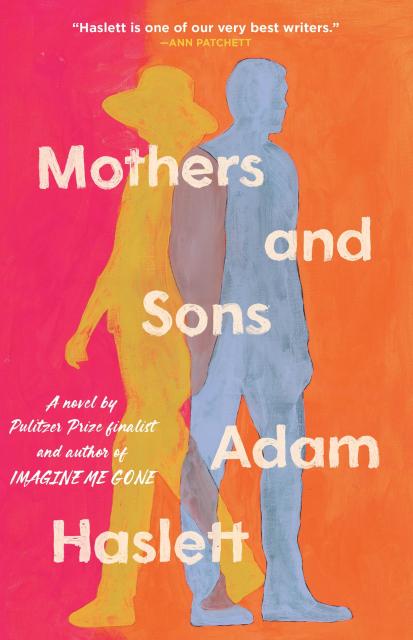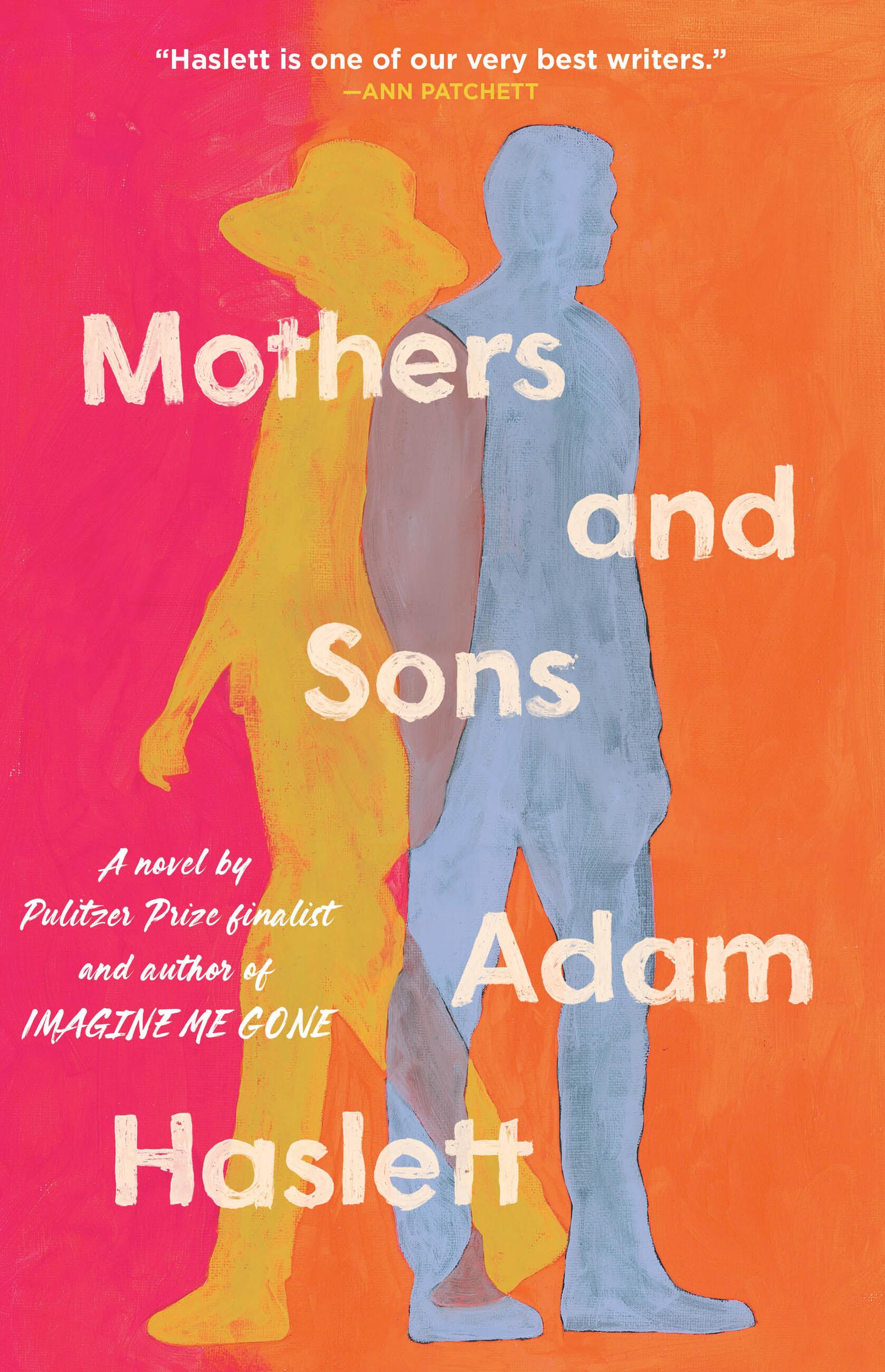
Mothers and Sons
A Novel
Contributors
By Adam Haslett
Formats and Prices
Price
$29.00Price
$38.00 CADFormat
Format:
- Hardcover $29.00 $38.00 CAD
- ebook $14.99 $19.99 CAD
- Audiobook Download (Unabridged) $27.99
Also available from:
At forty, Peter, an asylum lawyer in New York City, is overworked and isolated. He spends his days immersed in the struggles of immigrants only to return to an empty apartment and occasional hook-ups with a man who wants more than Peter can give. But when the asylum case of a young gay man pierces Peter’s numbness, the event that he has avoided for twenty years returns to haunt him.
Ann, his mother, who runs a women’s retreat center she founded after leaving his father, is hurt by the estrangement from Peter but cherishes the world she has built. She long ago put behind her the decision that divided her from her son. But as Peter’s case plunges him further into the fraught memory of his first love and the night of violence that changed his life, he and his mother must confront the secret that tore them apart.
With unsurpassed emotional depth, Mothers and Sons reveals all that is lost by looking away from the past and the love that might be restored by facing it. In his spellbinding new novel, Adam Haslett demonstrates yet again his mastery of “a rich assortment of literary gifts” (New York Times).
-
"Riveting...Unfurling across multiple timelines with impressive, confident fluidity, Mothers and Sons is a powerful study of the impossibility of trying to hold back the tides of familial hurt and trauma. When the levee finally breaks, the outcome is both heartbreaking and ultimately hopeful."Vogue
-
"There’s no better writer at chronicling the highs and lows of familial love. In Mothers and Sons, Haslett shows a family both torn by past trauma and battered by the social turmoil of the present…The chronicle of this complex mother and son pair satisfies one of the best reasons to read fiction: to understand others and their impossible burdens, to mourn when they stumble and celebrate when they survive."Los Angeles Times
-
“This beautifully written novel about the power of stories to redeem the past and reclaim the future is itself a tapestry of such narratives."O, The Oprah Magazine
-
“Well-paced and elegantly written, Haslett’s latest is a haunting work.”Minneapolis Star-Tribune
-
“Mothers and Sons could not be more timely. Haslett…is one of the most psychologically astute fiction writers in America…There’s a strange tension in Haslett’s work between urgency and introspection. Try as you might, you cannot rush this novel…His prose lies on the page with the intensity of a loosely coiled copperhead; you don’t even see the camouflaged danger until it strikes. He’s a master of incident and particularly of the ordinary line that’s transformed by his pacing and placement into something altogether devastating.”Ron Charles, Washington Post
-
“Mothers and Sons has a simple brilliance and charm, a subtle pull to delve deeper into the lives of [its] fraught characters and uncover the narratives we tell ourselves versus the truth. These are good people living ordinary lives, and it’s a pleasure to read about them."Chicago Review of Books
-
“With Mothers and Sons [Haslett] demonstrates once again his ability to produce graceful, emotionally affecting fiction whose characters’ struggles seem as real as those of people we know in our own lives…Deliberately, and with consummate skill, Haslett braids these stories until, in the final third of the novel, he reveals the devastating event that lies at the heart of the emotional gulf Ann and Peter must span…Haslett’s prose is simultaneously efficient and evocative, so that the pleasures of this touching novel extend well beyond those that flow from engaging with a psychologically astute and well-told story. In his capable hands, Mothers and Sons is an exemplar of realist fiction.”Bookreporter (starred review)
-
"The echoes of the Russian greats in the title aren’t misplaced—this is an epic family saga that packs an extraordinary emotional punch."The Guardian
-
“This deeply satisfying novel is a revelation—a thoughtful, psychologically acute, beautifully written examination of intersecting lives. The characters come alive on the page, commanding readers’ attention. This novel is sure to receive accolades, and it richly deserves them."Booklist (starred review)
-
"Haslett’s storytelling skill...is on quietly magnificent display… As much as both mother and son understand about the power of stories to harm and heal, they’ve failed to reckon with their own story, and the guilt and shame each has been carrying for decades. The momentum of the novel builds as long-held misunderstandings and resentments come to the surface, illuminating the meaning of what it means to be a mother, and a son, and culminating with a great sense of a weight lifted, of lightness and air.”Boston Globe
-
“Mothers and Sons” is Haslett’s best novel...he achieves new levels of moral depth and narrative push."New York Times Book Review
-
“Excellent…Mr. Haslett sets up this story with a delicacy that will not surprise anyone who read his beautiful 2016 novel, Imagine Me Gone, which featured a fretful, caretaking mother and her manic-depressive son. He is particularly good at depicting the ways—often admirable, sometimes blinding—that both Ann and Peter have been shaped by their work.”Wall Street Journal
-
“Mothers and Sons is both moving and deeply compelling, a story about the search for our own humanity, and the lengths we will go to maintain it. A new book by Adam Haslett is always cause for celebration. He is one of our very best writers.”Ann Patchett, New York Times bestselling author of Tom Lake and The Dutch House
-
“Mothers and Sons is like sonar in a lake, pinging out everything submerged, the hidden stories, the shames and the joys. There’s nothing else like it. Haslett’s characters feel so real, their choices so hard, their lives so true. He is everything you want in a writer.”Andrew Sean Greer, Pulitzer Prize–winning and New York Times bestselling author of Less
-
“A family-in-crisis story that keenly captures deep-seated fears and regrets…Haslett’s sophisticated grasp of the ways that people over-police their feelings makes it a remarkably acute and effective character study."Kirkus Reviews (starred)
-
“Irresistible…Themes of guilt, new beginnings, survival, and violence permeate the excellent and subtle story of characters grappling with events beyond their control, and the author delivers a deeply personal portrait of Peter’s tenacious advocacy for his clients. This matches the heights of Haslett’s best work.”Publishers Weekly (starred review)
- On Sale
- Jan 7, 2025
- Page Count
- 336 pages
- Publisher
- Little, Brown and Company
- ISBN-13
- 9780316574716
What's Inside
Judge Manetti calls out a name, ‘Dovgal, Matvey,’ and a white guy — mid-twenties, gray sweatshirt, gold chain — makes his way into the enclosure. He’s got a Legal Aid lawyer with him. The home address is Staten Island. His lawyer concedes his client received his notice to appear. He concedes he’s removable. Declines to specify country for removal. Why make the government’s job any easier? Judge Manetti designates Belarus. He’s claiming asylum; failing that, withholding of removal; failing that, Convention Against Torture. Callahan, the Department of Homeland Security lawyer, points out Dovgal has a theft conviction so he’s expedited. Manetti leafs through her calendar, a sheaf of wrinkled dot-matrix-printer pages stapled at one corner. Silence in the courtroom as the judge peers through her reading glasses searching for a date for the mer- its hearing. He will need an interpreter. Manetti’s got a Russian booked on a Wednesday in three months. The lawyers consult their phones. June 8, 2011. Agreed.
The courtroom is windowless. They all are. There are the fluorescent lights flush to the dropped ceiling. There is the judge’s miniature dais, the lawyers’ tables in front of it, the low bar with the hinged gate, the dark pink carpet. Respondents and their counsel cramped on benches either side of the gallery aisle, awaiting their turn. No one’s allowed to use their phones. All we can do is watch and listen.
Beside me on the bench, Sandra Moya whispers something in the ear of her fourteen-year-old son, Felipe. ‘Ask Mr. Peter,’ she says.
Then Felipe whispers in mine. ‘How much longer will it be? My mom can’t be late to work.’
He and his little sister, Mia, are citizens, but Felipe has told me that if his mother is sent back to Honduras, he wants to go with her. I know Sandra will never let that happen. She will make them both go to relatives.
‘They don’t tell us the order,’ I say. ‘We just have to wait. Soon, I hope.’
Next up, Fatima Saleem, Long Island high-school student, Pakistani, not present. The attorney making the appearance for her asks for a continuation pending family court proceedings. Files proof of the girl’s school attendance. Copy to the judge, who stamps it entered, copy to Callahan. Silence as everyone reads.
If she goes to school in Nassau, why was her first court appearance in Suffolk? the department wants to know. Her lawyer has no idea. Manetti agrees it’s a question. What’s the path of the application? Educate the court. She allows thirty days to submit. Callahan doesn’t object to the adjournment. The attorney shuffles out.
Neto, Winston. Black man in his early thirties, jeans and a white button-down, Legal Aid at his side. Application for cancellation of removal to Angola. Citizen wife, two citizen children. He was ordered removed four months ago.
Callahan is in a theatrical mood today. He waves a letter, issued this week, from the chief counsel to the whole Department: the hardship that a removal would cause must be stated at the time of application. ‘Your Honor,’ he says, ‘he’s in violation of a final order. We’re in overtime. Let him state his hardship.’
The Legal Aid lawyer says there’s no requirement to establish the nature of the hardship at a scheduling hearing.
‘What does that mean?’ Callahan asks. ‘He needs more time to invent it? He doesn’t know what his hardship is?’
Legal Aid repeats herself: No requirement. Manetti agrees. Callahan moves to put his boss’s letter in the record. Accepted. Thirty days to submit the reason for the hardship. The judge returns to her calendar. A Thursday in April, six weeks out. Agreed.
The older woman on my other side wearing a hijab leans forward and glares at Felipe, who gets the message and stills his bouncing legs. Instead, he crosses his arms tightly over his chest. He’s his mother’s timekeeper, there to hurry her into our office or court or out again to her job. The one she puts on the phone when I call asking for documents and usually the one who gets them to me.
‘Moya, Sandra,’ Manetti calls. Finally.
I shuffle past our disgruntled neighbor and lead the Moyas to the front. Callahan nods hello as we enter the enclosure. Pats Felipe on the shoulder, all buddy-buddy. As if he is anyone’s friend here.
‘Good morning, Your Honor. Peter Fischer for the respondent.’
‘Good morning, Mr. Fischer. Your client’s conceded service, she’s conceded she’s subject to removal, declined to designate a country for removal, the court designated Honduras, and she’s already scheduled. So what are we doing here this morning?’
I gesture for Sandra and Felipe to sit at the table, but Sandra shakes her head, and taking his cue from her, Felipe remains standing also.
‘Your Honor, my client’s requesting an adjournment. I have here an affidavit she’s signed attesting to the impediments she’s encountered trying to collect documentation to support her asylum application, most importantly witness statements. I’d request the affidavit be made part of the record.’
‘So ordered,’ Manetti says, taking the paper from me. Callahan doesn’t look up as I place his copy down on his table. He’s hunched over the file, flipping through it no doubt for the first time. He’s only halfway through the scheduling slog, but he’s sick of it already, all this procedure and delay. He thinks Manetti’s a soft touch, that most all the New York judges are. He’s bored and restless. It’s just a question now of where his eye happens to fall.
‘Does the department have a view?’ the judge inquires.
‘Well, Your Honor,’ Callahan says, still reading, ‘it seems Ms. Moya has been in this country quite some time, long enough to have given birth to her son here. She apparently did not come forward voluntarily. No record of an interview. And’ — he flips another page — ‘she’s been given one delay already. So, no, the department does not support the motion, and objects.’ With that he closes the file and leans back in his chair, his duty temporarily done.
‘As you know, Your Honor,’ I say, ‘the length of time my client’s been in the country has no bearing — ’
‘You’re right, Mr. Fischer, it doesn’t. But the fact she’s already on a continuance does, and she’s scheduled three weeks from now, so I’m disinclined. Who are these people she couldn’t reach in eight months who she’s supposedly going to reach if I grant your motion?’
Out of the corner of my eye, I see Felipe tilt his head back to glare at the ceiling instead of Manetti. He knows as well as Sandra does that this judge is most likely the person who will decide his mother’s fate.
‘One of the people,’ I say, ‘is an eyewitness to the events in question, a family relation we’re still working to contact, who we were recently told moved to Tegucigalpa.’
‘Oh, well, that narrows it down,’ Callahan says.
‘What it does,’ I say, ignoring him, ‘is confirm that Ms. Moya’s cousin is alive and that we have a chance to present her testimony in this case.’
For whatever reason, it’s now that Sandra chooses to sit. She rests her elbows on the table and clasps her hands together as if in prayer, though her expression couldn’t be further from worship. She wants this done. It’s not she who asked for extra time. I’m the one who told her it was needed. She told me the statements might never arrive. But with another couple of months they just might.
‘Your Honor,’ Callahan says, ‘if the court waited for everyone who is merely alive to testify, we’d all be dead before anyone had a hearing.’
‘All right, that’s enough,’ Manetti says. ‘Mr. Fischer, what you’re giving me just isn’t sufficient for another continuance. Motion denied. We’ll see you in three weeks.’
Felipe barrages me with questions as we exit the courtroom and head down the corridor. ‘Why did you ask for that? Does that woman hate my mom now? Did that make it worse?’
‘We needed to try,’ I tell him. ‘But your claim’s still strong,’ I say, addressing myself to Sandra. ‘You put in the work, you’re ready.’
Felipe goes quiet in the crowded elevator but as we squeeze out of it into the lobby, he’s back at me. ‘That judge hates us now,’ he says. ‘I could tell.’
‘No,’ I say, leading them toward the exit. ‘Manetti’s not going to count it against your mother.’
On Duane Street, the cold drizzle of early March has the lunch crowd sprouting umbrellas as they file past us out of the federal building.
Felipe wants more from me, some further assurance. But Sandra is past it, gazing off into Foley Square, where lawyers and staff and jurors scurry up and down the steps of the courthouses towering above them. I could have kept us in the lobby to debrief further but I’m already late for our staff meeting.
‘Remember — three weeks from tomorrow, meet here, one thirty.’
‘Sí,’ Sandra says, ‘lo sé.’ She turns and begins walking toward the subway entrance, Felipe stepping quickly behind her.
* * *
The line at Pret is to the door so I get a coffee and falafel from a food cart on Chambers and eat my wrap on the 1 train listening to voicemail: Joseph Musa’s wife, Jasmine, saying detention isn’t giving him his blood pressure meds. When am I going to visit him? Then the pro bono coordinator from Cleary, Gottlieb, hoping she can refer a Russian Baptist couple they don’t have room for in their program, so sorry to have to ask. And one from my older sister, Liz, complaining about the cost of health care for her foster dogs, one of whom is now apparently receiving radiation treatment, and that her almost-four-year-old, Charlie, still doesn’t shit on the toilet, but that’s obviously not your problem, and anyway, why do you never call me?
I get out at Houston Street, across from another federal building with another immigration court, and hurry to the office, where I finish my coffee in the conference room listening to case updates.
Monica has been at detention in New Jersey. A lockdown the night before means she saw only half the people she had scheduled and no intakes. She is unfazed by this, as always, and proceeds without complaint. Three Laotian women from the same job site in the Bronx have been in the Bergen County ICE facility for thirty-eight days. The department says they’re still waiting on records checks. Which is either nonsensical or true. The interpreter got more family cell numbers and will help with documents. Lucas Montes is the Brazilian father of four with the possession conviction in Elmont, which his lawyer pled out with no explanation to him of the immigration consequences. His daughter answered the door when ICE knocked. This morning Lucas told Monica about a fight he was in maybe eight years ago in Tampa that the police broke up, but he doesn’t think there was any record of it and doesn’t remember signing anything. So one conviction, not two — he might be okay.
Our director, Phoebe, begins to speak, but Monica cuts her off. ‘Don’t worry,’ she says, ‘I’ll call down to Tampa, I’ll make certain there was no charge.’
Phoebe has a cold and is less chipper than her usual self but no less vigilant. And no less put together, her gray hair clasped neatly in a silver barrette that matches her silver bracelets, her delicately wrinkled white skin freshly moisturized. It’s the basement of her town house that we work in, converted into an office decades ago, the garden glassed over to create this conference room.
Winston, the basset hound she is forever trying to cheer up, sleeps at her feet. Now that her husband, Jack, is retired, he is available to bring her tea.
Monica runs through a few more cases. Mostly Central Americans, mostly asylum seekers, the work Phoebe founded the place to do back in the ’80s. Plus a detainer for petty theft. It’s just a gloss, a check-in on a fraction of the fifty-odd clients that she, like the rest of us, is juggling. Carl and I don’t have much to add. Monica knows her business. She took the warden at detention the latest John Grisham novel for his birthday. He always tells the guards not to give her any trouble.
‘And I’m out next week,’ she concludes, flipping through her notes, ‘so I need someone to cover an intake, young Albanian guy, sexual-orientation claim.’
After a brief, avoidant silence, Phoebe says brightly, ‘Peter? You don’t do many of those, would you like to cover?’
‘He doesn’t do any of them,’ Monica says. ‘That’s not true,’ I say.
‘Yeah, it is,’ she counters as I turn from her stare to give Phoebe a little nod, accepting her request.
Up next is Carl, our crusading cofounder, old enough to have represented Czech dissidents and Russian musicians and organizers fleeing Pinochet — the old Left of the Cold War, a child of Jewish Communists turned conservative intellectuals, all of whose politics he rejected in favor of civil rights.
The pencil he’s forgotten is behind his ear, the one he’s found is pressed to his legal pad. Today he wears his gray cotton suit, the least worn of his three-suit rotation. He does a bit of everything now, but it’s the political claims that still matter most to him. They’re the ones he ticks off his list.
Giorgi Abasi, son of the Georgian newspaper editor murdered in his office, interview date set for December; the family has moved out of Tbilisi and he hasn’t heard from them in a while but he’s still thinking they’ll get him a police report, for what it’s worth.
Daniil Timirov, the blogger who covered protests at the Russian nickel-mining plant who’s living with his cousin in New Jersey; he’ll need to show the threats from the oligarch’s henchmen had some government nexus, which shouldn’t be hard, except it’s Judge LaRouche so it probably will be. The oligarch is in New York at the moment, so Daniil is not leaving his cousin’s house.
Mourad Gamal is proving to be a real problem. Or is in a lot of trouble. It’s difficult to tell which. He’s not responding to messages at the moment. The claim is that he has two brothers in a Cairo jail for putting together a strike. But there’s only one affidavit and it’s meandering. He’s skipped an interview prep already. Outlook guarded.
Carl checks off the names as he goes.
Javad Madani is new, an Iranian businessman who entered the U.S. via Italy on a false passport after learning the regime intended to imprison him. He’s still trying to get his family out, which is the priority for now, the asylum claim a comparatively easy lift because — Iran.
‘A businessman,’ Phoebe says. ‘Any chance he’s covering fees?’
She’s an old hand at the grants and the fundraising but is tired of it. She would close the place before declining anyone who can’t pay, but it doesn’t hurt if they can.
‘I gave him the sheet,’ says Carl, who couldn’t be less interested in the question.
Phoebe is the one with the wealthy friends. Carl regales them twice a year with his courtroom war stories only because Phoebe tells him that he must. Monica and I are better about it. We get the drill, the ways of the little nonprofit, while Carl remains offended. He’s lived in the same rent-controlled walk-up on West Twenty-First Street since the ’70s. The richer his neighborhood gets, the more derisive of it he becomes.
‘Either the man’s paying or he isn’t,’ he says. ‘Look at the sheet.’ Phoebe makes a note on a Post-it, then turns to me.
I used to prepare for these meetings. To have a list at the ready of cases it would be useful to get input on. Now it’s just pieces of the list in my head. I tell them about Sandra, the denial of the continuance, her hearing in three weeks. About Girvesh and Feba Rijal, the Nepalese couple who’ve promised me documents. If the claim fails, their daughter might still get juvenile status but they don’t want to think about that yet, having to leave her. Joseph Musa, the truck driver from Sierra Leone — I’m due at detention on Friday to see him and four others. Abraham John, the Ivorian with the election-violence claim who got caught up in a DUI. And there is my Sahrawi client, Hassan El Moctor, who needs to know if he can visit his sick mother in Rabat given that he’s seeking asylum from Morocco. I pause for a moment, trying to think past this week, but can’t.
‘That’s what I have,’ I say.
Phoebe’s smile is mildly disappointed but still somehow approving. She wants more. Not names, but texture. Still, I am forgiven for now.
She herself goes last and speaks the longest. She doesn’t need us for issue spotting. What she wants is to talk a particular case through. Not the law of it, but who her client is and what she’s experienced. After ten years of working for her, I keep thinking that at some point she will no longer want to do it this way, that it’ll be easier for her to run through files like the rest of us. Yet still every week she does it.
Her clients are mostly children now. The longer she’s done the work, the more this has been so. As if all along she’s been moving toward the keenest hardship, the least protected of the insecure, with whom, somehow, despite a caseload as heavy as any of us and the organization to run besides, she’s able to slow down. To dwell in the particulars of a given child’s circumstance and imagine a way forward. The law being just a piece of it.
It drives Carl mad. He fidgets and scribbles like a child himself— an elderly child gaunt with impatience. Sometimes when he can’t stand it, he bursts out: ‘Yes, yes, the suffering, the suffering, we get it, but who’s the judge, what can you appeal? It’s one case, Phoebe, one case.’ And like an old married couple they’ll bicker quickly and efficiently and she’ll return to her narrative as if he’d never spoken.
Today it is the recent life of an eight-year-old girl named Ana Andino. How two years ago, in her village north of San Miguel, she saw her father shot to death on the street in front of her; how she didn’t want to leave her grandmother and friends and schoolteacher but her mother said they had to go north; their journey through Guatemala and Mexico; the border crossing where the men held her mother back but took her into the desert; her detention in McAllen, her detention in Nashville, her transfer to New York. The HHS placement into foster care. The apartment in Washington Heights where a seventy-year-old woman takes care of her and five other children. The van that arrives early in the morning to take them to the shelter in East Harlem where the little ones sit in a roomful of teenagers trying to learn English. And finally the conversations Phoebe has with Ana in the shelter’s kitchen, learning about the girl’s favorite food and how she prays all the time under her breath. The actual content of those prayers. For her mother in the desert, for her older brothers, for her grandmother to get her diabetes medication.
Carl is beside himself.
Monica, herself once a client of Phoebe’s, having come from Nicaragua as a teenager, just drifts off, as she always does when she has to listen to these stories.
‘This girl,’ Phoebe says, ‘she has enormous eyes, almost too large for her head. I get lost in them just hearing her speak. Don’t sneer, Carl. It happens to all of us, even you, even if you don’t want to admit it. Some clients get under your skin. I’m saying it so it doesn’t just pile up inside. That’s how we shut down, that’s how we become bad lawyers.’
On the top page of his legal pad, Carl has sketched the planet Earth with a large rocket aimed directly at it.
‘That’s one theory,’ he says, ‘the other being learn to live with it. But hey, I’m not in charge of the emotional gestalt around here, so far be it from me to comment. I do however have a hearing to be at.’ And with that, he stands up to leave.
Back in my office, I open my laptop, click on the client folder, and a blizzard of new messages fill the screen. When I began the job, I replied to the emails of the people I represented the day I received them. But that was a long time ago. Now the task at hand is the task at hand. And this afternoon that’s the Rijal application, on which I am behind.
The documentation I have for conditions in Nepal is from an old case and needs updating. Girvesh and a group of other boys were kidnapped by the Maoists when he was eighteen, during the civil war. They were trying to recruit him but also wanted him to be their soccer coach. Neither of these qualifies him for asylum. But when his captors found out he belonged to the Nepal Student Union, they let the others go and kept him, so he’s got a political claim. The civil war is over, which doesn’t help, but the Maoists are in power, which does.
I read State Department reports, NGO reports, newspaper articles, expert witness testimony scraped from filings in other cases, anything I can vacuum up off the internet before having to email experts myself and begin the process of cajoling and bargaining and scheduling them.
Monica is the only one still there when I take a break around eight o’clock. I ask her if she wants barbecue again, and she says yes, so I order it, and when it arrives I eat mine standing in her office doorway.
‘What’s this with you being out next week, anyway?’ I ask. ‘I’m going on vacation.’
‘That’s funny,’ I say.
‘No, I’m serious, that’s why I’m out next week. I’m going to Vermont. I’ve decided I want to learn how to ski.’
‘You’re going skiing?’
‘Why, you think a brown woman can’t be into that?’
‘No, I just can’t believe you’re into it. Did you get a Groupon or something?’
‘Fuck you,’ she says.
For a moment, I picture Monica in a rental car, on her way to some ski resort, driving up the hillside past my mother’s retreat center, but then I doubt that she will go that far north.
After ten years of working with her, what I know of Monica’s life outside the job is that there isn’t a great deal of it. She lives in a rent-stabilized apartment in the West Nineties with her mother, whom she brought over from Nicaragua after Phoebe helped her through college and law school. Her father was disappeared by the Somoza regime during the revolution. Once on a winter evening in the car as we were on the way back from detention, she told me, apropos of nothing, that for a long time she’d hated her father for what his idealism had cost their family, but eventually she’d understood. She’d never meant to be an immigration lawyer. It was just a start after law school in the office of the nonprofit that had helped her. What she meant to do was get a corporate job and buy a house in Jersey where her mother could have a garden and grow vegetables. But that was twenty years ago, and here she still is.
‘I don’t see you taking any vacation,’ she says.
Which is true. I don’t.
‘But at least you’ll be here to cover the Albanian,’ she says. ‘Now that Phoebe forced you to. I take every other Nicaraguan who knocks on the door but you’re the gay one and leave all the gays to me and Phoebe.’
‘No, I had Afsana Ravani. I took that all the way to appeal.’
‘The Baloch woman? It was a political claim. She was incidentally lesbian. You didn’t even argue that.’
‘Are you giving me this person’s phone sheet or not?’ I ask.
She looks across the stack of files on the floor beside her desk, finds what she’s after, and holds it out to me.
‘Here you go,’ she says. ‘I tried to reschedule but he didn’t answer.’
Monica stays till nine, and I leave a few minutes later. Out on King Street, through the parlor windows of Phoebe’s town house, I see her husband, Jack, in the comfortable amber light of the wood-paneled living room, stirring a drink at the sideboard. A tax partner now retired from Davis, Polk. Past chair of the Bar Committee on Professional Ethics. The old epitome of trusted counsel to major concerns. He wears cardigans and collects Art Deco clocks. If Phoebe’s fundraising now and then runs short, Jack is always there, proud sponsor of his wife’s good works. He has more faith in her than in his itinerant children and their romantic dramas. Finished stirring, he places two glasses on a tray and carries them deeper into the chandeliered parlor.
I get a seat on the train and scroll through news — ‘Gaddafi’s Forces Bomb Misrata,’ ‘Obama Signs Bill Preventing Government Shutdown,’ ‘Heroin Distribution Network Raided’ — until we reach High Street–Brooklyn Bridge. On the stairs up to Cadman Plaza, I consider calling my sister back but text Cliff instead. By the time I reach my lobby, he’s texted to say sure, he’ll come by in an hour.
Which gives me a chance to pull a few more quotes for the Nepal synopsis.
He arrives with three beers in a canvas bag and offers me one. White, thirty, Nebraskan, a web designer of some kind. It’s been three months now that he’s been coming over like this, once or twice a week.
I close my laptop for the day and join him at the other end of the couch.
‘How’s that deranged schnauzer?’ he asks.
The woman in the apartment next to mine, at the end of the hall, is unwell and treats her animal poorly. It whimpers and barks all hours of the day and night. But she’s an owner and I’m a renter and the noise isn’t as bad for the others on the floor and they are scared of the woman so don’t want to get involved.
‘I guess it’s fine,’ I say. ‘I haven’t noticed it tonight.’
He takes his shoes off and swings his legs up, then touches the balls of his feet to my thigh. ‘You look tired,’ he says.
‘Thanks.’
‘I didn’t say you looked bad,’ he says, grinning. ‘I like you in a shirt and tie.’
He’s found a song, an Elliott Smith ballad, and sets his phone down on his chest, pointing the little speaker in my direction. I close my eyes and rest my hand on his shin. It’s wrong to call him innocent — he’s been in the city a while, getting by — but when he’s here he acts it, as if he’s a wide-eyed ingénu and I, ten years older, am somehow impressive. I don’t know if he has a real boyfriend or not, though I doubt it. In any case, it’s not something we’ve discussed.
‘You could tell me things,’ he says. ‘Like about the work you do.’
‘I’ve told you about my job,’ I say.
‘No, actually, you haven’t.’ When I make no reply, he takes another swig of beer and says, ‘But it’s okay, you can be a mystery.’
He prefers the light on in the bedroom but doesn’t object when I turn it off. Once, on a weekend, he slept over. But it’s a Tuesday, and when we’re done he doesn’t ask. He just dresses and checks his phone. By the time I say good night to him at the door, the dog down the hall has begun to bark.






